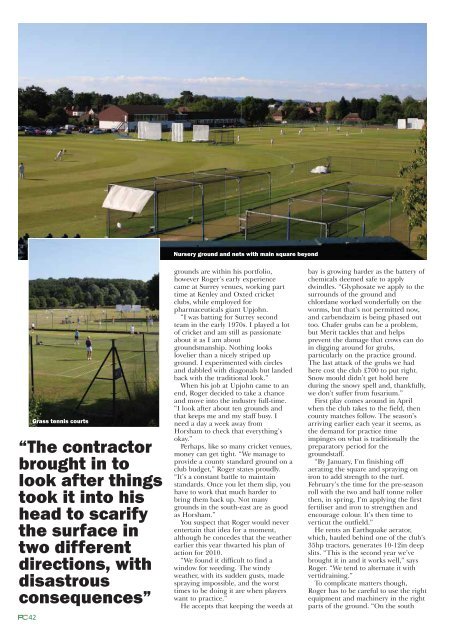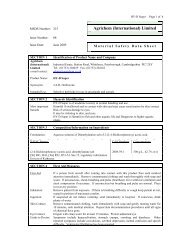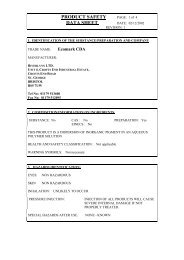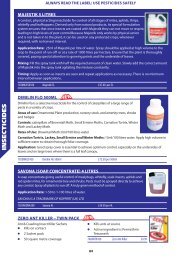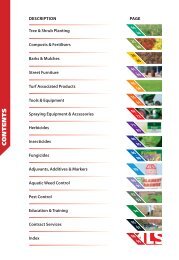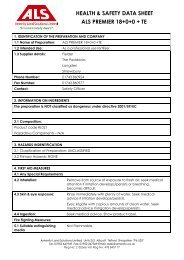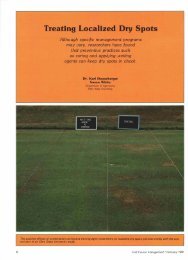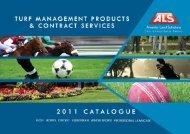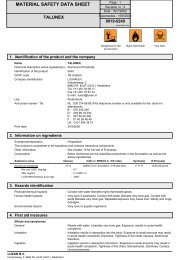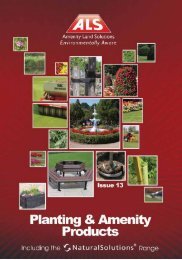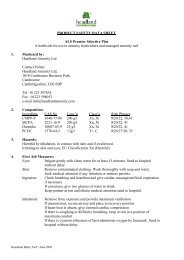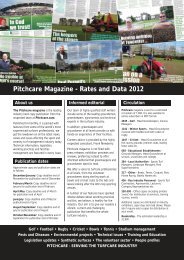Earning his Spurs - Pitchcare
Earning his Spurs - Pitchcare
Earning his Spurs - Pitchcare
Create successful ePaper yourself
Turn your PDF publications into a flip-book with our unique Google optimized e-Paper software.
Grass tennis courts<br />
“The contractor<br />
brought in to<br />
look after things<br />
took it into <strong>his</strong><br />
head to scarify<br />
the surface in<br />
two different<br />
directions, with<br />
disastrous<br />
consequences”<br />
42<br />
Nursery ground and nets with main square beyond<br />
grounds are within <strong>his</strong> portfolio,<br />
however Roger’s early experience<br />
came at Surrey venues, working part<br />
time at Kenley and Oxted cricket<br />
clubs, while employed for<br />
pharmaceuticals giant Upjohn.<br />
“I was batting for Surrey second<br />
team in the early 1970s. I played a lot<br />
of cricket and am still as passionate<br />
about it as I am about<br />
groundsmanship. Nothing looks<br />
lovelier than a nicely striped up<br />
ground. I experimented with circles<br />
and dabbled with diagonals but landed<br />
back with the traditional look.”<br />
When <strong>his</strong> job at Upjohn came to an<br />
end, Roger decided to take a chance<br />
and move into the industry full-time.<br />
“I look after about ten grounds and<br />
that keeps me and my staff busy. I<br />
need a day a week away from<br />
Horsham to check that everything’s<br />
okay.”<br />
Perhaps, like so many cricket venues,<br />
money can get tight. “We manage to<br />
provide a county standard ground on a<br />
club budget,” Roger states proudly.<br />
“It’s a constant battle to maintain<br />
standards. Once you let them slip, you<br />
have to work that much harder to<br />
bring them back up. Not many<br />
grounds in the south-east are as good<br />
as Horsham.”<br />
You suspect that Roger would never<br />
entertain that idea for a moment,<br />
although he concedes that the weather<br />
earlier t<strong>his</strong> year thwarted <strong>his</strong> plan of<br />
action for 2010.<br />
“We found it difficult to find a<br />
window for weeding. The windy<br />
weather, with its sudden gusts, made<br />
spraying impossible, and the worst<br />
times to be doing it are when players<br />
want to practice.”<br />
He accepts that keeping the weeds at<br />
bay is growing harder as the battery of<br />
chemicals deemed safe to apply<br />
dwindles. “Glyphosate we apply to the<br />
surrounds of the ground and<br />
chlordane worked wonderfully on the<br />
worms, but that’s not permitted now,<br />
and carbendazim is being phased out<br />
too. Chafer grubs can be a problem,<br />
but Merit tackles that and helps<br />
prevent the damage that crows can do<br />
in digging around for grubs,<br />
particularly on the practice ground.<br />
The last attack of the grubs we had<br />
here cost the club £700 to put right.<br />
Snow mould didn’t get hold here<br />
during the snowy spell and, thankfully,<br />
we don’t suffer from fusarium.”<br />
First play comes around in April<br />
when the club takes to the field, then<br />
county matches follow. The season’s<br />
arriving earlier each year it seems, as<br />
the demand for practice time<br />
impinges on what is traditionally the<br />
preparatory period for the<br />
groundstaff.<br />
“By January, I’m finishing off<br />
aerating the square and spraying on<br />
iron to add strength to the turf.<br />
February’s the time for the pre-season<br />
roll with the two and half tonne roller<br />
then, in spring, I’m applying the first<br />
fertiliser and iron to strengthen and<br />
encourage colour. It’s then time to<br />
verticut the outfield.”<br />
He rents an Earthquake aerator,<br />
which, hauled behind one of the club’s<br />
35hp tractors, generates 10-12in deep<br />
slits. “T<strong>his</strong> is the second year we’ve<br />
brought it in and it works well,” says<br />
Roger. “We tend to alternate it with<br />
vertidraining.”<br />
To complicate matters though,<br />
Roger has to be careful to use the right<br />
equipment and machinery in the right<br />
parts of the ground. “On the south


